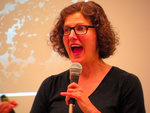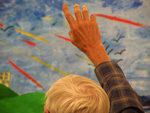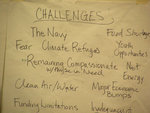On the nightly news on June 18, 2015, Greece was in crisis, people were mourning the deaths of nine black people shot by a white man in a church in Charleston, South Carolina, and there were more …
This item is available in full to subscribers.
We have recently launched a new and improved website. To continue reading, you will need to either log into your subscriber account, or purchase a new subscription.
If you had an active account on our previous website, then you have an account here. Simply reset your password to regain access to your account.
If you did not have an account on our previous website, but are a current print subscriber, click here to set up your website account.
Otherwise, click here to view your options for subscribing.
* Having trouble? Call our circulation department at 360-385-2900, or email our support.
Please log in to continue |
|



On the nightly news on June 18, 2015, Greece was in crisis, people were mourning the deaths of nine black people shot by a white man in a church in Charleston, South Carolina, and there were more flash floods in Texas.
A light rain fell here that night as almost 100 people filled the Port Townsend Community Center to hear Tina Clarke, an international Transition advocate, talk about the Transition movement. Movement organizers see the realities of the world – economic, environmental, energy and the equity crises – and opt to come together to solve problems locally, community by community.
“We are in such a crisis that we have to ask for things that are absolutely politically infeasible,” Clarke said. “We have to ask for things that are a complete transition of our economy to energy efficiency, wind, water and solar, a changing landscape and land-use patterns, cluster and tighter accommodations.
“As these challenges unfold, more and more people are going to fall into fear. What we know is that people do not change well when they are afraid,” she told the audience of both community members and elected officials, as well as some wannabe elected officials.
Clarke urged people to create a positive vision of the future “in spite of all the reasons you are overwhelmed,” and look for opportunities for change.
“We've got to come together and really dream big or we're not going to be able to help society shift,” she said softly.
Clarke acknowledged that coming to Port Townsend to talk about the Transition movement – which she did for four days – felt like being on a vacation because people here "get it."
Local 20/20, one of the groups that hosted Clarke's visit to Port Townsend, joined the Transition Initiative in 2012 and nationally, Port Townsend became the 111th such community. The Transition Initiative then became what now is known as the Transition movement.
LOCAL 20/20
Judy Alexander, a founder of Local 20/20, reminded the audience of an example of the Transition movement – an upcoming All-County Picnic, set this year for Aug. 23, which is an opportunity for the community to get together to celebrate community as well as to do emergency disaster preparedness planning. Alexander noted that more than 100 neighborhoods have come together to do disaster planning.
Coming together to solve problems is the kind of thing that communities do as they transition toward self-reliance, Clarke said.
“The calvary isn't coming. It's up to us. It's re-remembering democracy where citizens and government are not separate. We don't allow anyone to separate us,” she said of wanting people to realize that the government shouldn't carry all the responsibility for solving every problem in a community.
“The idea of actually thoughtfully coming together to create resilient villages and towns is something that has caught the world's imagination and it is happening everywhere,” Clarke said.
Clarke also urged Port Townsend to continue its work, including this week as residents are asked to weigh in on the city's comprehensive plan tonight. (See related story on page A3).
“It is something that needs to be led and supported by an active citizenry and I think your town is poised to be a real model of how to do this,” Clarke said.
Before Clarke gave her keynote speech, she asked those in attendance to share what they felt are the challenges facing the community. Hands went up from community members and elected officials, including Barney Burke, a commissioner for the Jefferson County Public Utility District, Michelle Sandoval, Port Townsend city councilor and a real estate broker, and Larry Crockett, Port of Port Townsend executive director.
Climate change, a growing demand for increasing services in the city, and concerns about the U.S. Navy were all issues of concern, to name just a few of dozens of worries raised that night.
Local 20/20 has pledged to give the city a copy of the challenges that surfaced at the meeting as well as visions for the future and possible positive projects that were explored in a session on Saturday.
And moderator Larry Dennison brought up former PT mayor John Clise to share his recollections of the first growth management planning process the city did 20 years ago. Dennison noted that the meetings of those days, called charrettes, were similar to the forums 20/20 did last week with Clarke and the “transitioning together” forums.
POSITIVE TACK
Clarke urged community members to choose to think positively and forge good relationships with one another.
“The reason why you choose the positive when you are reading the negative and learning … you choose the positive because your brain works better,” she said.
“In transitioning, we look at the potential for crisis and then we consciously choose to have a great life, to have fun and be positive.
“The trick here in the Transition movement is that if we look at all the realities, the worst case scenarios, you don't shy away from the truly awful runaway global warming scenario and the economic crunch.
“Instead, you say, 'Oh well, 120 years ago we had to deal with Carnegie and J.P. Morgan and the Rockefellers and the robber barons. And during the Black Plague, Europe lost a third of its population. We've been through the Holocaust.' We humans are pretty resilient.”
Clarke said a bottom-up way of solving problem means “the community gets stronger with more volunteerism, more trust in local government and more citizen participation.”
Clarke shared a story about a group of women who got together to sew cloth bags in one community to replace plastic bags. Not only did they connect with women from World War II who had fabric to spare from decades earlier, and had remembered harder times, the women learned about the issues of plastic, and created a sense of community. By putting a local logo on the bags, shop owners got to know local shoppers.
Clarke, who has a master's degree in public policy and studied under famed economist Milton Friedman, said she originally thought saving the world from climate change would take a larger group and a larger effort, not a small group of activists like the women in that small town.
“I'm so wrong,” she said of what she thought after the women spoke at a conference she attended, “The way we are going to save the planet is through love and fun.”
And that was how she ended her talk on a night when news of the world was about economic collapse, social inequality and flash floods in Texas.